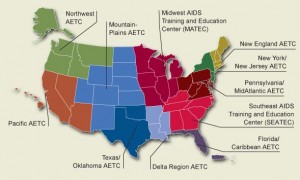The AETC Network Responds to the National HIV/AIDS Strategy
Topics

The AIDS Education and Training Centers (AETCExit Disclaimer) are working in a number of ways to support the goals set out in the President’s National HIV/AIDS Strategy. The AETC Program, administered by the Health Resources and Services Administration’s (HRSA) HIV/AIDS Bureau and five National AETCsExit Disclaimer. The mission of the AETCs is to improve the quality of life of patients living with HIV/AIDS through the provision of high quality professional education and training for health care providers. The centers conduct targeted, multi-disciplinary education and training programs for health care providers treating persons with HIV/AIDS in all 50 States, the District of Columbia, the Virgin Islands, Puerto Rico, and the six U.S.-affiliated Pacific Jurisdictions. Training is targeted to providers who serve minority populations, the homeless, rural communities, incarcerated persons, community and migrant health centers, and Ryan White CARE Act-funded sites. AETCs focus on training a diverse group of clinicians including physicians, advanced practice nurses, physician assistants, nurses, oral health professionals, and pharmacists. The Regional AETCs partner with 130 local centers of HIV care, including academic healthcare institutions, minority-serving agencies, and community or public health centers, termed Local Performance Sites, to deliver to deliver tailored training to clinical sites throughout the country based on local needs and practices as well as capacity building work, clinical consultation, and information dissemination.
In support of the Strategy’s first goal, reducing new HIV infections, the AETCs provide cutting-edge training programs regarding HIV transmission, prevalence, and prevention with a focus on risk-reduction processes and motivational interviewing skills. Materials have been created and distributed on HIV testing laws listed on a state-by-state basis. Over the past five years an emphasis has been placed on education of primary care providers to incorporate HIV prevention and increase routine HIV testing in primary care settings, emergency departments, STD clinics, community health centers, and hospitals. After training is provided, additional technical assistance is offered to implement the testing knowledge gained and address any identified barriers. Between July 2008 and June 2009, the AETC network conducted 642 trainings for 22,669 health care providers focused on implementation of the CDC’s HIV testing recommendations Warmline, PEPLine, and Perinatal Line linking community-based health care providers with leading clinical experts in the field, many working in academic medical centers. Our programs and services are offered both to novice and experienced HIV care providers alike to enable them to keep pace with the ever-evolving practice guidelines as well as developing changes based on new scientific findings; this information is shared via email listservs, didactic or skills building presentations, clinical trainings, and educational clinical consultations. The AETC National Resource Center provides links to the major treatment guidelinesExit Disclaimer on their web site as well as numerous other resources developed within the AETC network to assist clinicians in their care of people living with HIV. Longitudinal training is encouraged for participants. To assure quality of education offered, the National Evaluation CenterExit Disclaimer works with the Regional AETCs for outcome analysis of the training efforts. In response to activities specifically tasked in the NHAS Federal Implementation plan, the AETCs and HRSA also are working to expand training for HIV clinicians and provider organizations to address provider-associated factors (e.g., cultural competency, provider continuity) that affect treatment adherence.
The AETCs are also engaged in activities in specifically in support of reducing HIV-related health disparities and inequities, which is Goal 3 of the Strategy. Through funding by the Minority AIDS Initiative (MAI), the AETC network has put special emphasis on recruiting minority health care personnel for training regarding HIV. In fiscal year 2008-2009, 44% of all AETC trainees were racial or ethnic minorities themselves and the vast majority of trainees serve a largely minority population. Health care professionals who provide services to communities of color, women, gay/lesbian/bisexual/transgender persons, prisoners, the homeless, the uninsured, and drug users also are targeted for training. Training is also given to primary care personnel and other health care providers to promote early diagnosis and decrease stigma associated with HIV, leading to better outcomes. In September 2010, HRSA created two new National Centers for resources and contact information for all the Regional and National AETCs.This blog was prepared by the National Alliance for HIV Education and Workforce Development (NAHEWD), an organization made up of the leadership of the Regional AETCs and several of the National Centers. If you have any questions about the AETC Network or NAHEWD, please contact Ronald D. Wilcox, MD, President of NAHEWD, at rwilco@lsuhsc.edu, or Daria Boccher-Lattimore DrPH, Vice-President of NAHEWD, at dmb82@columbia.edu.